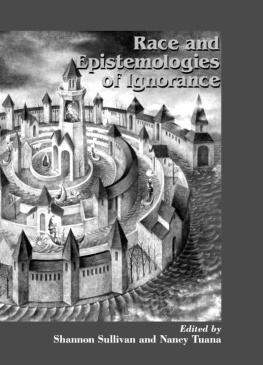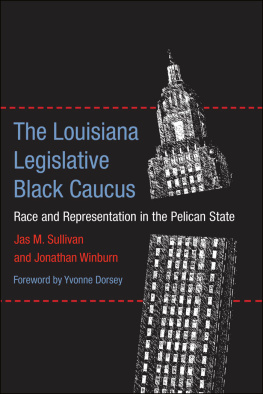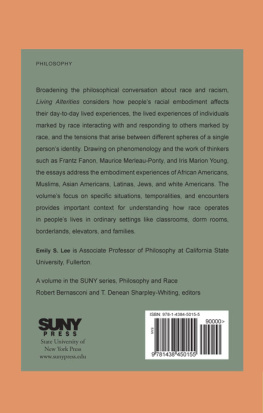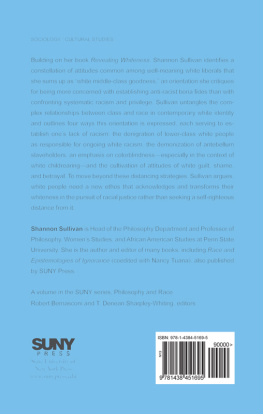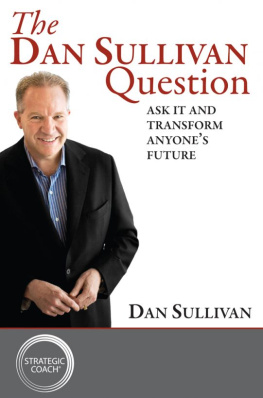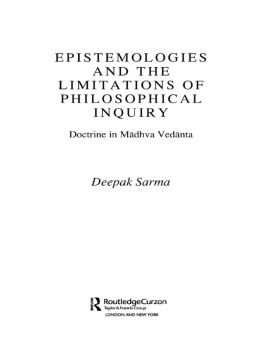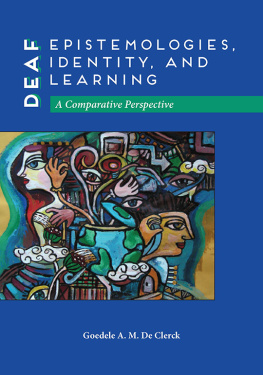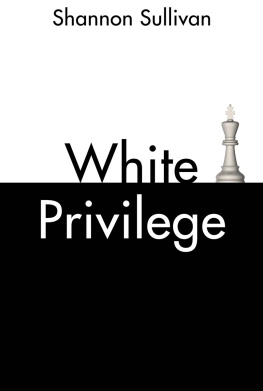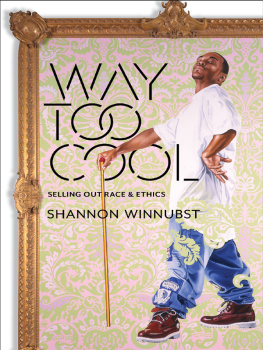Shannon Sullivan (editor) - Race and Epistemologies of Ignorance
Here you can read online Shannon Sullivan (editor) - Race and Epistemologies of Ignorance full text of the book (entire story) in english for free. Download pdf and epub, get meaning, cover and reviews about this ebook. year: 2010, publisher: State University of New York Press, genre: Politics. Description of the work, (preface) as well as reviews are available. Best literature library LitArk.com created for fans of good reading and offers a wide selection of genres:
Romance novel
Science fiction
Adventure
Detective
Science
History
Home and family
Prose
Art
Politics
Computer
Non-fiction
Religion
Business
Children
Humor
Choose a favorite category and find really read worthwhile books. Enjoy immersion in the world of imagination, feel the emotions of the characters or learn something new for yourself, make an fascinating discovery.
- Book:Race and Epistemologies of Ignorance
- Author:
- Publisher:State University of New York Press
- Genre:
- Year:2010
- Rating:5 / 5
- Favourites:Add to favourites
- Your mark:
- 100
- 1
- 2
- 3
- 4
- 5
Race and Epistemologies of Ignorance: summary, description and annotation
We offer to read an annotation, description, summary or preface (depends on what the author of the book "Race and Epistemologies of Ignorance" wrote himself). If you haven't found the necessary information about the book — write in the comments, we will try to find it.
Race and Epistemologies of Ignorance — read online for free the complete book (whole text) full work
Below is the text of the book, divided by pages. System saving the place of the last page read, allows you to conveniently read the book "Race and Epistemologies of Ignorance" online for free, without having to search again every time where you left off. Put a bookmark, and you can go to the page where you finished reading at any time.
Font size:
Interval:
Bookmark:

Ronald Bernasconi and T. Denean Sharpley-Whiting, editors
EDITED BY
Shannon Sullivan and Nancy Tuana
Shannon Sullivan and Nancy Tuana
PART I: THEORIZING IGNORANCE
Charles W. Mills
Chapter 39
Linda Martin Alcoff
Chapter 59
Harvey Cormier
Chapter 77
Alison Bailey
Chapter 95
Sarah Lucia Hoagland
Chapter 119
Elizabeth V. Spelman
PART II: SITUATING IGNORANCE
Chapter 135
Paul C. Taylor
Chapter 153
Shannon Sullivan
Chapter 173
Frank Margonis
Chapter 197
Lucius T. Outlaw (Jr.)
Chapter 213
Lorraine Code
Chapter 231
Robert Bernasconi
Chapter 241
Stephanie Malice Fullerton
Epistemology and ignorance-how could two such different things go together? Given that epistemology is the study of how one knows and ignorance is a condition of not knowing, epistemology would seem to have nothing to do with ignorance. At best, it might appear that the two concepts are related in that epistemology studies the operations of knowledge with the goal of eliminating ignorance. But in either case, epistemology and ignorance seem diametrically opposed. What, then, might be an epistemology of ignorance, and what possible connections might it have to issues of race?
The epistemology of ignorance is an examination of the complex phenomena of ignorance, which has as its aim identifying different forms of ignorance, examining how they are produced and sustained, and what role they play in knowledge practices. The authors in this volume examine the value of applying an epistemology of ignorance to issues of race, racism, and white privilege. Ignorance often is thought of as a gap in knowledge, as an epistemic oversight that easily could be remedied once it has been noticed. It can seem to be an accidental by-product of the limited time and resources that human beings have to investigate and understand their world. While this type of ignorance does exist, it is not the only kind. Sometimes what we do not know is not a mere gap in knowledge, the accidental result of an epistemological oversight. Especially in the case of racial oppression, a lack of knowledge or an unlearning of something previously known often is actively produced for purposes of domination and exploitation. At times this takes the form of those in the center refusing to allow the marginalized to know: witness the nineteenth-century prohibition against black slaves' literacy. Other times it can take the form of the center's own ignorance of injustice, cruelty, and suffering, such as contemporary white people's obliviousness to racism and white domination. Sometimes these "unknowledges" are consciously produced, while at other times they are unconsciously generated and supported. In both cases, our authors examine instances where they work to support white privilege and supremacy.
But ignorance is not only a tool of oppression wielded by the powerful. It also can be a strategy for the survival of the victimized and oppressed, as in the case of black slaves' feigned ignorance of many details of their white masters' lives. This survival strategy also can take the form of the oppressed combating their oppression by unlearning the oppressor's knowledge, which has been both passively absorbed and actively forced upon them. Ignorance can be used against itself. It can be an important tool for the oppressed to wield against their oppressors, including their production of ignorance to dominate and exploit.
As this volume attests, tracing what is not known and the politics of such ignorance should be a key element of epistemological and social and political analyses, for it has the potential to reveal the role of power in the construction of what is known and provide a lens for the political values at work in our knowledge practices. Although racial oppression has been investigated as an unjust practice, few have fully examined the ways in which such practices of oppression are linked to our conceptions and productions of knowledge. Even less attention has been paid to the epistemically complex processes of the production and maintenance of ignorance. As the underside of knowledge, ignorance warrants careful examination, and nowhere is this truer than in the case of race and racism.
An exception to the neglect of racialized ignorance can be found in the work of Charles Mills who, in his book The Racial Contract (1997), argues that "[o]n matters related to race, the Racial Contract prescribes for its signatories an inverted epistemology, an epistemology of ignorance, a particular pattern of localized and global cognitive dysfunctions (which are psychologically and socially functional), producing the ironic outcome that whites will in general be unable to understand the world they themselves have made" (1997, 18). For Mills, the epistemology of ignorance is part of a white supremacist state in which the human race is racially divided into full persons and subpersons. Even though-or, more accurately, precisely because-they tend not to understand the racist world in which they live, white people are able to fully benefit from its racial hierarchies, ontologies, and economies.
Another exception to the neglect of racialized ignorance can be found in the work of Marilyn Frye. In The Politics of Reality (1983), Frye similarly explains that "ignorance is not something simple: it is not a simple lack, absence or emptiness, and it is not a passive state. Ignorance of this sort-the determined ignorance most white Americans have of American Indian tribes and clans, the ostrichlike ignorance most white Americans have of the histories of Asian peoples in this country, the impoverishing ignorance most white Americans have of Black language ignorance of these sorts is a complex result of many acts and many negligences" (1983, 118). Frye demonstrates how white ignorance often is an active force in the lives of those, such as feminists, who think of themselves as anti-racist. Far from accidental, the ignorance of the racially privileged often is deliberately cultivated by them, an act made easier by a vast array of institutional systems supporting white people's obliviousness of the worlds of people of color.
Although they do not focus on race, other exceptions to the neglect of manufactured ignorance can be found in the fields of history and science studies. Robert Proctor's (1996) examination of the "cancer wars" in the United States argued that political factors have negatively impacted cancer research, deliberately creating confusion and uncertainty about the carcinogenic risk of products such as tobacco, meat, and asbestos. Influenced by the work of Proctor, Mills, and Frye, Nancy Tuana (2004) examined the value of an epistemology of ignorance for a better understanding of the ways in which sexism informs the science of female sexuality. Invoking the idea of "agnotology," or the study of what is unknown, Londa Schiebinger (2004) examined the sexual politics behind the creation of ignorance of abortifacients in Europe. Given Proctor's, Tuana's, and Schiebinger's focus on ignorance as a culturally and politically induced product, their work on the role of ignorance in science complements the application of epistemologies of ignorance to racialized ignorance introduced by Frye and Mills and developed here. I
Font size:
Interval:
Bookmark:
Similar books «Race and Epistemologies of Ignorance»
Look at similar books to Race and Epistemologies of Ignorance. We have selected literature similar in name and meaning in the hope of providing readers with more options to find new, interesting, not yet read works.
Discussion, reviews of the book Race and Epistemologies of Ignorance and just readers' own opinions. Leave your comments, write what you think about the work, its meaning or the main characters. Specify what exactly you liked and what you didn't like, and why you think so.

